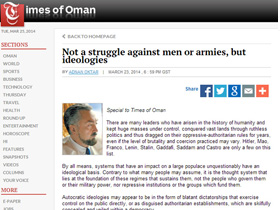

There are many leaders who have arisen in the history of humanity and kept huge masses under control, conquered vast lands through ruthless politics and thus dragged on their oppressive-authoritarian rules for years, even if the level of brutality and coercion practiced may vary. Hitler, Mao, Franco, Lenin, Stalin, Gaddafi, Saddam and Castro are only a few on this list.
By all means, systems that have an impact on a large populace unquestionably have an ideological basis. Contrary to what many people may assume, it is the thought system that lies at the foundation of these regimes that sustains them, not the people who govern them or their military power, nor repressive institutions or the groups which fund them.
Autocratic ideologies may appear to be in the form of blatant dictatorships that exercise control on the public directly, or as disguised authoritarian establishments, which are skilfully concealed and veiled within a democracy.
In order to have a better understanding of regimes, which are not viewed as outright dictatorial but still constrain people, the Institutional Revolution Party (Partido Revolucionario Institucional) that governed Mexico for 71 years offers an example. The PRI did not resort to practices normally associated with dictators such as blatant electoral corruption or the use of the armed forces.
However, by means of intimidation and restraint, the elites of the country coalesced around the party and no strong opposition remained outside the party. Besides, businessmen confronting the party encountered unspeakable hardships, while backers were handsomely rewarded which precluded a resilient opposition and kept the PRI in power for more than seven decades. The PRI dissolved with time because of the introduction of elite cliques and losing its ideological grounds. That being the case, the most long-lasting hegemonic political party in world history lost the elections in the year 2000.
The economic stagnation and ideological ossification of the Soviet Union worked for the collapse of the Communist regimes in Eastern Europe. They were weakened once the Soviet Union's financial support to these dictatorial regimes was discontinued with and furthermore because Communism lost internal dynamism and democracy.
Consequently, the regimes in the Eastern Bloc melted away as they could no longer resist the growing demands for change in the 1990's. Party leaders in many of the countries of the bloc realised the only way out for them was to abandon the oppressive policies of the Communist epoch and that culminated in the establishment of multi-party democracies and stable regimes.
Today's youth largely look at examples of such overt dictatorships in books, particularly written on the world wars and their consequences, but they have also encountered such regimes over the past three years of the Arab Spring. The Ben Ali regime in Tunisia, Ali Saleh's regime in Yemen, Gaddafi's regime in Libya and the Mubarak regime in Egypt are indisputable cases of dictatorships.
The eradication of such regimes may only be possible through extensive and long-lasting ideological education. Adopting any other means would only indicate a misguided approach. Those expecting opposing parties to sit around a table for a resolution through diplomacy or dialogue in Egypt are, to say the least, sorely mistaken.
There are some leaders and countries that expect the civil war in Syria to end when they sit together in a room and sign a few agreements. Frequently people come up with questions, such as whether Syria should be under Assad or not.
However, even ousting Bashar Al Assad entirely from history would not be a step towards resolution of the Syrian imbroglio. The various parties fighting in Syria are determined to preserve their ideologies.
The Ba'ath regime is being reinforced by the Shanghai Pact member countries and would obviously want to stay on track with Assad.
Just as the execution of Saddam Hussein did not abolish the Ba'ath ideology, the bloodshed in Syria will not end if a single person or his family withdraws from the regime. History shows us that autocratic regimes can only be ousted by means of an ideological struggle.
Regimes flourish only when they are fortified ideologically, occasionally bringing the entire community together as a body around common values. Therefore, those who desire to end the civil war in Syria should first commit to a strong-willed intellectual struggle against materialism, which is the heart of the Ba'athist party.
Adnan Oktar's article on Times of Oman & Burma Times:


